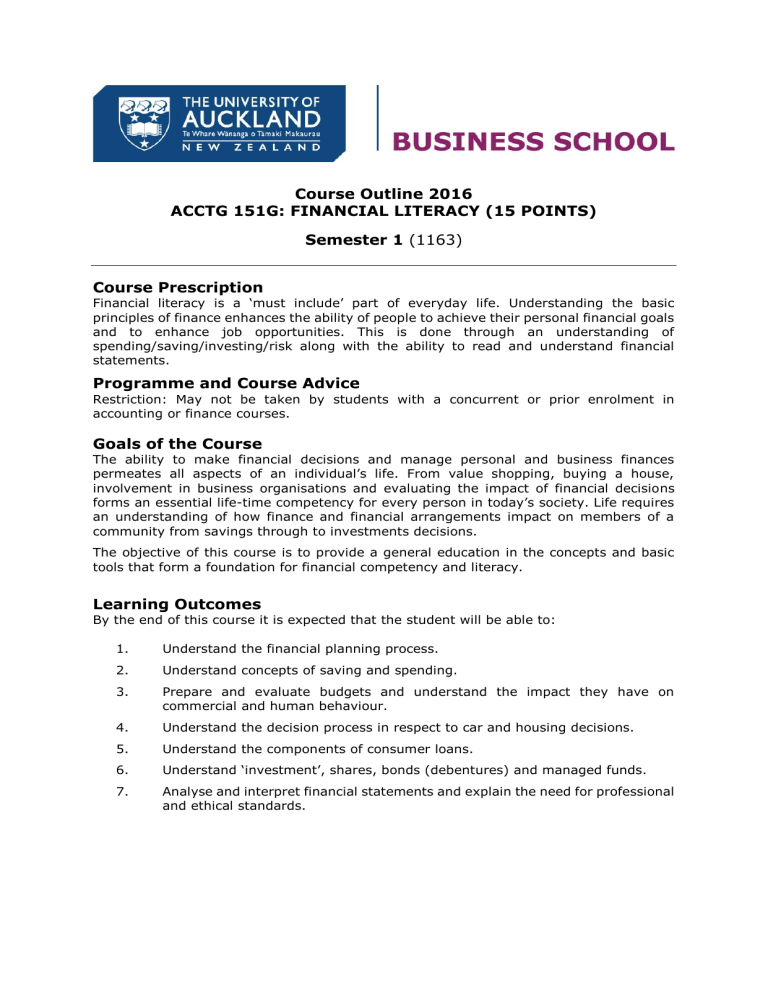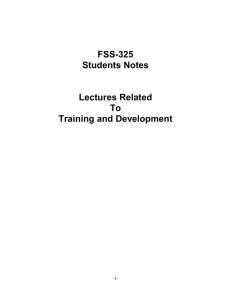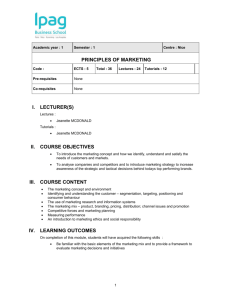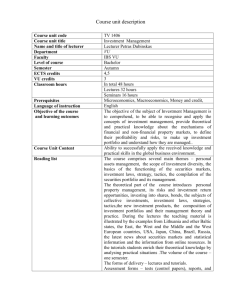Course Outline 2016 ACCTG 151G: FINANCIAL LITERACY (15 POINTS) Semester 1 Course Prescription

Course Outline 2016
ACCTG 151G: FINANCIAL LITERACY (15 POINTS)
Semester 1
(1163)
Course Prescription
Financial literacy is a ‘must include’ part of everyday life. Understanding the basic principles of finance enhances the ability of people to achieve their personal financial goals and to enhance job opportunities. This is done through an understanding of spending/saving/investing/risk along with the ability to read and understand financial statements.
Programme and Course Advice
Restriction: May not be taken by students with a concurrent or prior enrolment in accounting or finance courses.
Goals of the Course
The ability to make financial decisions and manage personal and business finances permeates all aspects of an individual’s life. From value shopping, buying a house, involvement in business organisations and evaluating the impact of financial decisions forms an essential life-time competency for every person in today’s society. Life requires an understanding of how finance and financial arrangements impact on members of a community from savings through to investments decisions.
The objective of this course is to provide a general education in the concepts and basic tools that form a foundation for financial competency and literacy.
Learning Outcomes
By the end of this course it is expected that the student will be able to:
1.
Understand the financial planning process.
2.
3.
Understand concepts of saving and spending.
Prepare and evaluate budgets and understand the impact they have on commercial and human behaviour.
4.
5.
6.
7.
Understand the decision process in respect to car and housing decisions.
Understand the components of consumer loans.
Understand ‘investment’, shares, bonds (debentures) and managed funds.
Analyse and interpret financial statements and explain the need for professional and ethical standards.
Content Outline
Topic Module
1.
Course introduction
Financial planning process
6.
7.
8.
2.
3.
4.
5.
9.
10.
11.
12.
Your financial statements and plans
Managing your cash and savings
Making car and housing decisions
Using consumer loans
Investment planning
Investing in shares and bonds
Investing in managed funds
Lecture
1
2 and 3
4 - 6
7 and 8
9 and 10
15 - 17
18
20 10, WHS Annual Report
21
22
23 and 24
1, 2
Reading#
1, 2, 3
4
11 and 12 4, 11
1, 3, 10
13 and 14 6, 7, 8, 9
6, 8, 9
5
Financial Statements (Performance) 19 10, WHS Annual Report
Financial Statements (Position)
Financial Statement Analysis 1
Financial Statement Analysis 2
Revision
Learning and Teaching
To achieve the outcomes above we will utilise lectures, tutorials and written assignments.
The class meets for three hours per week comprising two hours of lectures and one hour of tutorial. The lectures will be recorded and accessible on Cecil on the same day. Students are expected to use at least six additional hours each week in reading and preparing for the class. Active involvement is essential, and students will be expected to master material assigned in readings and presented in lectures and tutorials.
Teaching Staff
Lecturer (and Course Coordinator)
Graeme Treasure
Office: OGGB Level 5 Room 579
Tel: 373 7599 Ext 85342
Email: g.treasure@auckland.ac.nz
Tutor
TBC
Office: TBC
Tel: TBC
Email: TBC
Learning Resources
There are no prescribed text books as readings are provided in the Course Book. However there are a number of applicable publications which it is recommended you seek out:
1.
2.
3.
4.
5.
6.
7.
Personal Financial Planning by Gitman, Morrison and Joehnk
Money, which is available as a FREE download from the web site http://www.sharechat.co.nz/news/scnews/article.php/1b668cfc
NZ Herald http://www.nzherald.co.nz/section/12/index.cfm?c_id=12
National Business Review (NBR)
NZ Stock Exchange (NZX) website; http://www.nzx.com
Other material, of which you will be advised in lectures and uploaded on Cecil.
Various websites such as Retirement Commission, www.sorted.org.nz
Lectures
Venue
LgeChem (301-G050)
LgeChem (301-G050)
Tutorials
Day
Wednesday
Thursday
Time
9am – 10am
10am – 11am
Venue
Eng3404 (403-404)
Day
Thursday
Time
1pm – 2pm
Eng3404 (403-404) Thursday
Assessment
Term test – 1 hour
On-line CSL test – 1 hour
One individual written assignment
Final exam of 2 hours which will cover the semesters work
Modules Term test On-line Test
2pm – 3pm
20%
20%
10%
50%
1-3
1-5
1-7
X
X
Assignment
X
Final
Examination
1-12 X
Minimum Requirements
To pass this course an overall grade of at least 50% is required.
‘Plussage’ applies in this course. The overall grade is based on either the calculation above, or the mark in the final exam, whichever is higher, provided all minimum requirements specified for coursework are satisfactorily completed.
The minimum level of coursework is defined as attempting the term test, the on-line CSL test and the submission to a satisfactory standard (grade > 30%) of the assignment.
Inclusive Learning
Students are urged to discuss privately any impairment-related requirements face-toface and/or in written form with the course convenor/lecturer and/or tutor.
Student Feedback
Student feedback will be gathered and assessed throughout the course to ensure that any issues are addressed immediately.
A student course evaluation will be requested at the end of semester and comments will be used to inform any plans for changes to the course.





